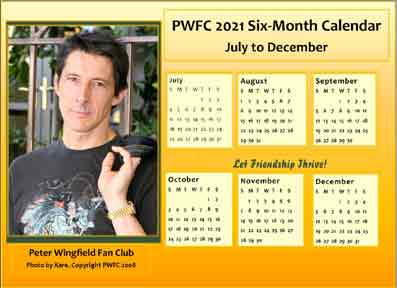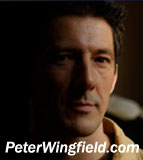Getting Behind The Last Sin Eater With Brian Bird
In 2007 , PWFC President, Ree Averett (RA), had the opportunity to interview the writer/producer of The Last Sin Eater, Brian Bird (BB). Although the entire interview appears in issue #42 of LFT, this is an excerpt from that interview. After reading the interview, be sure to read Peter’s notes from the set of the movie, if you haven’t already done so.
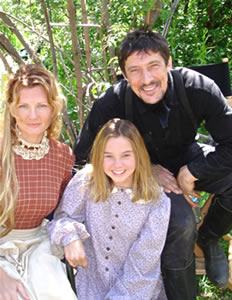 RA: What was it about the story that made this particular book stand out as a story that you would like to see as a screenplay?
RA: What was it about the story that made this particular book stand out as a story that you would like to see as a screenplay?
BB: What was amazing about Francine River’s novel to me is that it asks a universal question that I think all mankind, no matter what culture or period of history, always asks: “How do I atone for my wrongdoings?” After I read the book, it made me ask that question in my own life, and if it could do that to me... I knew there was a movie here. Plus, I loved time and place in which it was set — Appalachia, among an isolated clan of Welsh immigrants, in the 1800s — and ancient ritual it was based on, strange and yet somehow familiar all at the same time. The novel had such a strong dramatic throughline, and a little girl’s quest through some very disturbing subject matter. The tone of the piece reminded me in a strange way of one of my favorite movies of all time, “To Kill a Mockingbird,” and I figured we had something really rich to draw on if we could give the audience that kind of moving experience.
RA: Often the adaptation of a book to screen changes some of the elements and players of the book. How in tact is the book storyline to the film?
BB: We were very faithful to the core idea, characters and dramatic themes of Francine Rivers’ novel. As in any book adaptation, the biggest challenge is not what to keep in the screenplay, but what to leave out. There were several very rich subplots in the novel that we ultimately had to eliminate because we were contractually committed to deliver the film under two hours. But it was very helpful to start eliminating those subplots because the true heartbeat of the story begin to emerge very clearly to us — Cadi Forbes’ quest for forgiveness. And by just sticking with her quest, we found we were able to carefully weave in a few of the subplots that were relevant to her character journey in the story.
RA: Did the way the actors who portrayed the characters surprise, challenge, intrigue, and show you something different and wonderful that changed the way you saw the story?
BB: We were blessed with an absolutely amazing cast. It’s true that Michael Landon, Jr., and I made the final choices from all the auditions that we saw, but our casting directors Victoria Burrows and Scot Boland — who cast The Lord of the Rings, along with many other huge feature films — did an absolutely amazing job of finding some terrifically talented people for these roles. We saw a lot of good actors for each of the parts, and that would have made our decisions really hard. But for each part, there was always one person who came into read who literally took the role off the table. They just came in and basically said with their performance that “this is my role,” and nobody is going to take it from me. Those were the people we cast in the film and we were blown by all their performances. Each of the cast members internalized this script and completely embodied the characters.
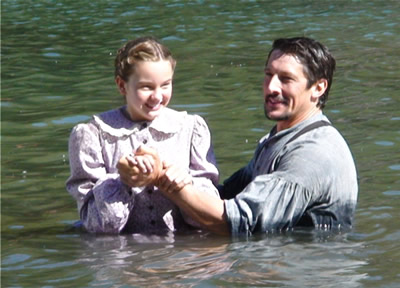
RA: Peter told us that when he auditioned for the role that you and Mr. Landon were considering casting the part of the Sin Eater with two different actors. Why did you feel that might be necessary and what about Peter changed that opinion?
BB: We were initially thinking of using two actors because it occurred to us that the Sin Eater would be hidden under his cloak the entire movie — save for one short scene where we are in close on his eyes — and at the very end where he is revealed for the first time. There was some talk of trying to “stunt-cast” the Sin Eater so there would be a fun surprise for the audience at the end when he is revealed. In that way, we could have had one actor play the role the entire movie and then bring in a “big star” when the hood comes off. But when Peter Wingfield came into read for us, we realized what a great opportunity it would be to have a classically trained actor playing the part “behind the mask.” It’s a very “Phantom of the Opera” or “V for Vendetta” opportunity. He came in to read for us in a hood and hid his face from us the entire audition and we were blown away by his amazing body language and voice. We looked at each other and said this is our Sin Eater.
RA: Working from Francine Rivers’ book, did you have a clear idea in mind for what the Sin Eater would look like? Was Peter the type you had in mind during the casting process or did this change during the audition?
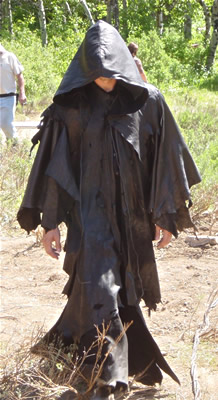 BB: We knew we wanted to create a “phantom”-like wardrobe for the Sin Eater, so in a way, we knew he would be hidden the entire film. But we also knew that it was going to be a big moment when he was revealed, so we knew we needed an actor that would please and surprise us when we saw his face. Believe me, there were very big actors who came in and begged for the part because they loved the idea of playing the role under cover. But when Peter pulled his hood off at the end of the audition, it confirmed for us that his very noble face was exactly the right look for us. We even had some gasps in test screenings because audiences expected an unkempt, hermit-like character. And when the very-handsome Peter emerged, they were stunned. What was great about this little surprise is that it played very nicely into the Sin Eater’s unrequited love story with a woman he had wanted to marry twenty years ago, but from whom he had to remain isolated because of his Sin Eater role in the community. He was a man still in love who kept himself groomed, even though he had resigned himself never to be with his lady.
BB: We knew we wanted to create a “phantom”-like wardrobe for the Sin Eater, so in a way, we knew he would be hidden the entire film. But we also knew that it was going to be a big moment when he was revealed, so we knew we needed an actor that would please and surprise us when we saw his face. Believe me, there were very big actors who came in and begged for the part because they loved the idea of playing the role under cover. But when Peter pulled his hood off at the end of the audition, it confirmed for us that his very noble face was exactly the right look for us. We even had some gasps in test screenings because audiences expected an unkempt, hermit-like character. And when the very-handsome Peter emerged, they were stunned. What was great about this little surprise is that it played very nicely into the Sin Eater’s unrequited love story with a woman he had wanted to marry twenty years ago, but from whom he had to remain isolated because of his Sin Eater role in the community. He was a man still in love who kept himself groomed, even though he had resigned himself never to be with his lady.
RA: When you auditioned Peter for the role, were you familiar with any of his previous work?
BB: We, of course, had seen Peter in Highlander, and his modest role in X-Men II, so we had a sense of him. But what we didn’t know about was his amazing stage and dance background. In a way, this little film has a very Shakespearean feel about it, and having a classically trained stage actor in the title role became a real bonus for us.
(images courtesy of Brian Bird)
